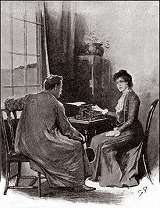THE extract from my private diary which forms the last chapter has brought my narrative up to the eighteenth of October, a time when these strange events began to move swiftly towards their terrible conclusion. The incidents of the next few days are indelibly graven upon my recollection, and I can tell them without reference to the notes made at the time. I start them from the day which succeeded that upon which I had established two facts of great importance, the one that Mrs. Laura Lyons of Coombe Tracey had written to Sir Charles Baskerville and made an appointment with him at the very place and hour that he met his death, the other that the lurking man upon the moor was to be found among the stone huts upon the hillside. With these two facts in my possession I felt that either my intelligence or my courage must be deficient if I could not throw some further light upon these dark places.
I had no opportunity to tell the baronet what I had learned about Mrs. Lyons upon the evening before, for Dr. Mortimer remained with him at cards until it was very late. At breakfast, however, I informed him about my discovery and asked him whether he would care to accompany me to Coombe Tracey. At first he was very eager to come, but on second thoughts it seemed to both of us that if I went alone the results might be better. The more formal we made the visit the less information we might obtain. I left Sir Henry behind, therefore, not without some prickings of conscience, and drove off upon my new quest.
When I reached Coombe Tracey I told Perkins to put up the horses, and I made inquiries for the lady whom I had come to interrogate. I had no difficulty in finding her rooms, which were central and well appointed. A maid showed me in without ceremony, and as I entered the sitting-room a lady, who was sitting before a Remington typewriter, sprang up with a pleasant smile of welcome. Her face fell, however, when she saw that I was a stranger, and she sat down again and asked me the object of my visit.
The first impression left by Mrs. Lyons was one of extreme beauty. Her eyes and hair were of the same rich hazel colour, and her cheeks, though considerably freckled, were flushed with the exquisite bloom of the brunette, the dainty pink which lurks at the heart of the sulphur rose. Admiration was, I repeat, the first impression. But the second was criticism. There was something subtly wrong with the face, some coarseness of expression, some hardness, perhaps, of eye, some looseness of lip which marred its perfect beauty. But these, of course, are after-thoughts. At the moment I was simply conscious that I was in the presence of a very handsome woman, and that she was asking me the reasons for my visit. I had not quite understood until that instant how delicate my mission was.
“I have the pleasure,” said I, “of knowing your father.”
It was a clumsy introduction, and the lady made me feel it.
“There is nothing in common between my father and me,” she said. “I owe him nothing, and his friends are not mine. If it were not for the late Sir Charles Baskerville and some other kind hearts I might have starved for all that my father cared.”
“It was about the late Sir Charles Baskerville that I have come here to see you.”
The freckles started out on the lady’s face.
“What can I tell you about him?” she asked, and her fingers played nervously over the stops of her typewriter.

“You knew him, did you not?”
“I have already said that I owe a great deal to his kindness. If I am able to support myself it is largely due to the interest which he took in my unhappy situation.”
“Did you correspond with him?”
The lady looked quickly up with an angry gleam in her hazel eyes.
“What is the object of these questions?” she asked sharply.